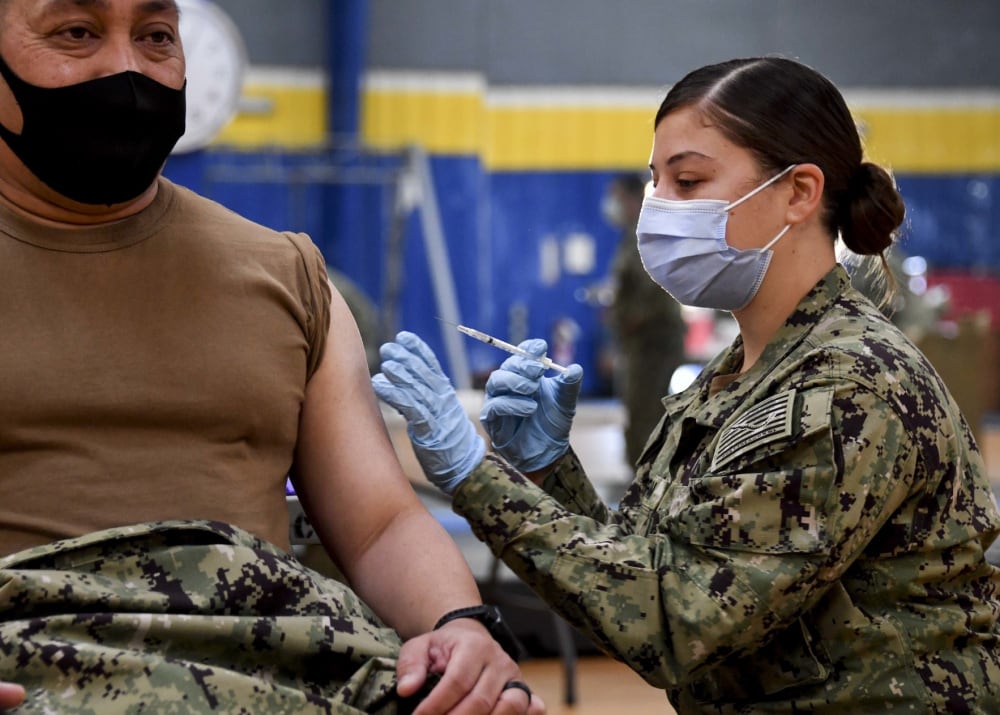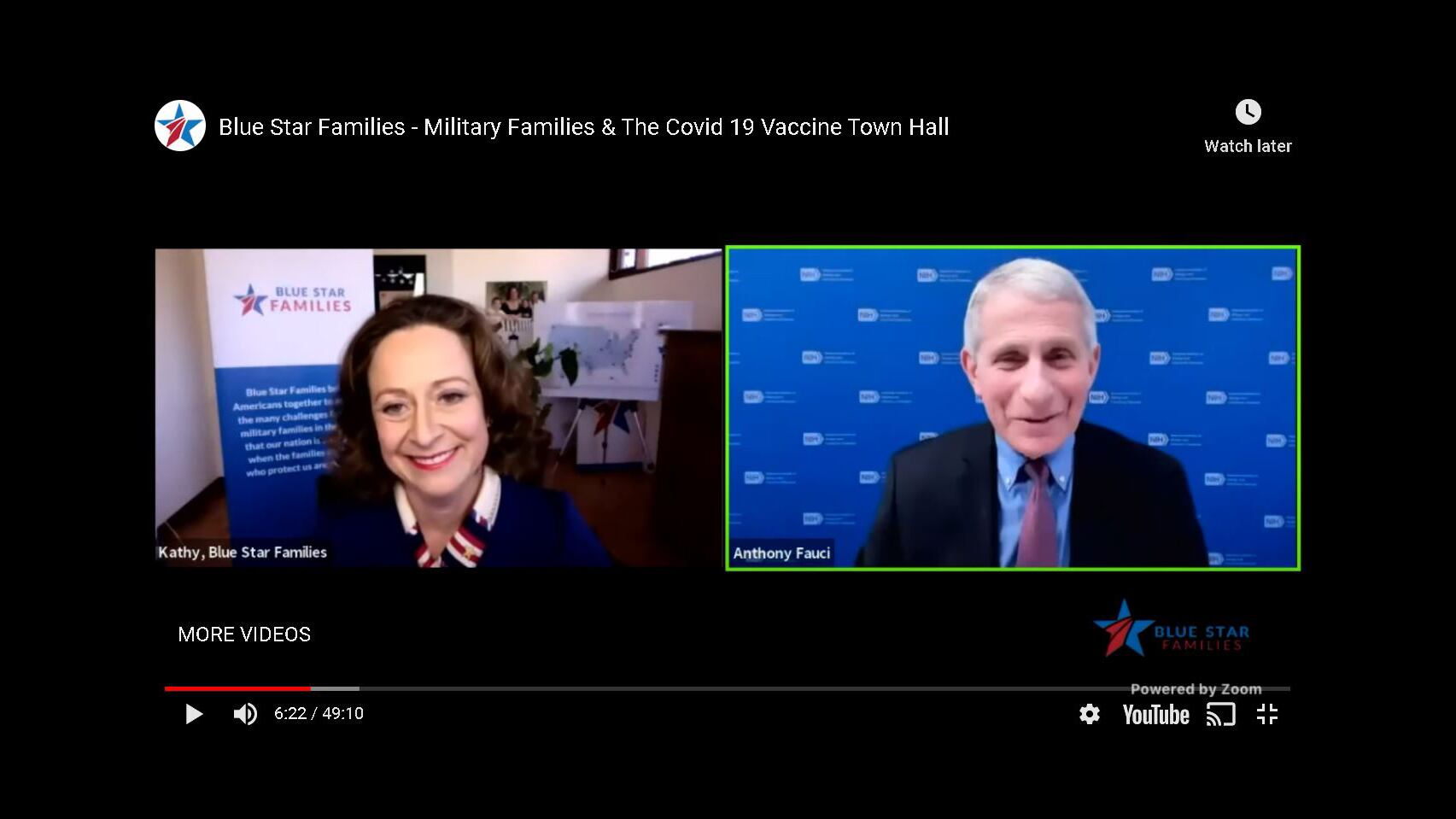After their recent poll showed that more than half of military families don’t plan to get the COVID-19 vaccination, Blue Star Families brought in the big guns — including Dr. Anthony Fauci, first lady Jill Biden, Gen. Mark Milley, chairman of the Joint Chiefs of Staff, and his wife Hollyanne — to urge military families to get the facts before making their decisions.
Fauci, director of the National Institute of Allergy and Infectious Diseases, and medical leaders in the Defense and Veterans Affairs departments answered a variety of questions about the vaccines’ safety, and where to get the shot in the 49-minute town hall for military families Thursday, with more than 10,000 viewers.
Blue Star Families and the American Red Cross convened the town hall following an online poll from mid-December that indicated 54 percent of military spouses and 49 percent of service members had decided not to get the COVID-19 vaccination.
“We know military families have real concerns and questions about the COVID-19 vaccine,” said Kathy Roth-Douquet, CEO of Blue Star Families. According to the poll results, those concerns ranged from distrust of the development process, to the vaccine’s safety and efficacy, as well as the potential for unknown side effects.
RELATED

From first lady Jill Biden, to the Milleys, to Senior Enlisted Advisor to the Chairman of the Joint Chiefs of Staff Ramon “CZ’ Colon-Lopez and his wife Janet, the message was to evaluate the facts for each individual and family, to make the best decision.
“We ask that you keep an open mind about the vaccine,” said Janet Colon. “Don’t let social media drive your decision. Stay updated. We understand the struggle with this vaccine decision, and we’ve had the same conversation in our home. We encourage you to work with your primary care doctor to address concerns you may have about getting vaccinated,” she said.
“Brighter days are close. We need your help,” said Biden. “That’s why we’re encouraging everyone to mask up, social distance, and get the vaccine when it’s your turn. We can beat this together.”
Fauci said although the trend is in the right direction over the last few weeks, there are still between 100,000 to 200,000 new COVID cases each day, and anywhere from 3,000 to 4,000 deaths. “That is the sobering and sad news, but the light at the end of the tunnel is the extraordinary success we’ve had with the vaccine development program,” he said, before taking a number of questions about the safety of the vaccine, and described the deliberate process for scientific evaluation and approval.
“That’s why many of you hear me say, ‘When your turn comes up, please get vaccinated, both for your own safety, for that of your family, and for the American community in general,’ ” Fauci said.
On the other hand, there are plenty of people in the military community who do want to get the vaccination, and were asking where and when to get it.
Military health care beneficiaries can go to a military treatment facility or to sources in the civilian community to get their vaccinations, said Army Lt. Gen. Ronald Place, director of the Defense Health Agency. “No one, whether they rely on an MTF for care or not, is compelled to come to a military treatment facility for a vaccine,” he said. “If it’s available in the community and it’s easier for you to get it there, get it at your first opportunity.” If a beneficiary normally gets care at their MTF, they should let the MTF know they’ve gotten the vaccination so the records can be updated, he said.
All this also depends on the availability of the vaccine at different civilian and military locations.
As the vaccine becomes available, the local MTFs will be calling and sending secure messages to notify beneficiaries who get their care there. In some areas, MTFs are vaccinating those 75 and older, as well as others who are eligible under the guidelines, and officials hope to expand to those 65 and older in some locations, he said. A number of civilian jurisdictions have started vaccinating those 65 and older.
Those who don’t rely on the MTF for care, for example, those in Tricare Select, will also be able to get the vaccination at an MTF, if it’s available to their eligibility group.
For those who live 40 or more miles from an MTF, officials are directing them to state and local resources for information about vaccine availability; working with the Tricare contractors to get information to patients, and working with military service organizations to get the information out.
Military families in the U.S., as well as those overseas, are accounted for in DoD’s vaccine requirement numbers, he said.
Overseas: The military is only using the Moderna vaccine, which is only for adults 18 and over. Pfizer doesn’t ship its vaccine overseas, Place said. The military has long had processes in place for receiving and administering vaccines, he said. For the most part, overseas locations haven’t worked their way through the queue to be able to vaccinate healthy family members, he said.
Guard and Reserve: Units are receiving vaccine supplies, he said. Family members of those activated for 30 days or more will be eligible for treatment in MTFs, but again, right now MTFs aren’t yet vaccinating healthy younger people.
Some questions Dr. Fauci answered:
• How do we know the vaccines are safe? The Moderna vaccine was tested on 32,000 people; the Pfizer vaccine was tested on 44,000. “The results were striking in the positive,” Fauci said. They were 94- to 95 percent effective against the disease, and provided almost 100 percent protection against sever disease leading to death. The safety record has been good, too, he said.
• Were corners cut to develop the vaccines so quickly? “The speed is completely related to the extraordinary advances in scientific platform technology for vaccine. There were no corners cut. We didn’t sacrifice safety, nor did we sacrifice scientific integrity.” Those involved in the decisions were independent bodies of vaccinologists, scientists, immunologists, statisticians … who “were not beholden to the federal government or companies, but to you, the American public, he said.
• What about children? Not yet. Scientists have started trials testing the vaccine on children.
• What about pregnant women? Tests are starting now with pregnant women, who weren’t allowed in the first trials. However, about 10,000 pregnant women have been given vaccinations. Many were health care providers who decided the risk of getting COVID from their patients was far greater than any potential adverse effects from the vaccine, Fauci said.
• It’s impossible to get infected with the coronavirus from the vaccine.
• Can the vaccine get into your genes? “Absolutely not. It decays after a couple of days and it’s gone forever,” Fauci said.
• Will vaccinations be required each year? Don’t know, he said. Scientists don’t yet know the durability of the body’s response to the vaccine.
• Are you still contagious after getting the shot? You might be. It’s conceivable you could be carrying the virus in your nose, and have no symptoms. So while you’re much more protected because of the vaccine, you must wear a mask to protect other people, he said.
The Blue Star Families online poll was conducted online in mid-December. The results showed 54 percent of military spouses and 49 percent of service members who responded said they didn’t plan to get the COVID-19 vaccination. There were 613 spouses who responded to the poll, and 57 service members. Of the 133 veteran family members who responded to the poll, 46 percent said they would not get the shot.
The poll results showed “showed we need to establish the credibility and build the trust in the community,” said Roth-Douquet.
“On the other hand we’re very sympathetic to the distrust people have … their health and their family’s health … nothing’s more important to us. We honor people’s concerns, and we want to give them the tools to self-advocate and make the choices that are going to be best for themselves and their units and their communities,” she said.
Karen has covered military families, quality of life and consumer issues for Military Times for more than 30 years, and is co-author of a chapter on media coverage of military families in the book "A Battle Plan for Supporting Military Families." She previously worked for newspapers in Guam, Norfolk, Jacksonville, Fla., and Athens, Ga.





